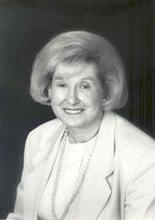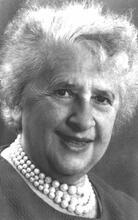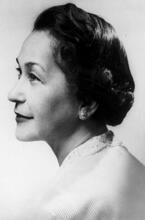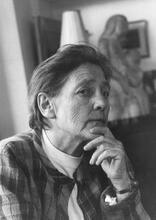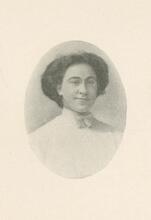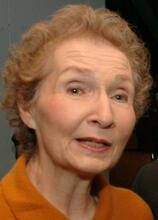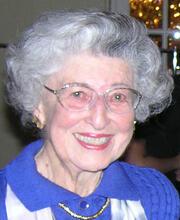Martha Tamara Schuch Mednick
While Martha Mednick spent her early career raising a family, after her divorce in 1964 she became a professor at Howard University, where she taught for thirty years. There she mentored many leading African American psychologists. She chaired the American Psychological Association’s ad hoc committee leading to the creation in 1973 of a new division that focused on the psychology of women. Two years later she co–edited Women and Achievement, a collection of long-term studies of women’s careers. She also wrote “Social Change and Sex Role Inertia: The Case of the Kibbutz,” which debunked the myth of Israeli settlers’ gender equality. In 1981 she organized the first international interdisciplinary conference on women at Haifa University, bringing together American, Israeli, and Arab women scholars.
One of the most influential women in the development of the psychology of women was Martha Mednick. She was born on March 31, 1929, in New York City of working-class immigrant parents who “had an almost mystical belief in the power of education to change the condition of life.” She described her years through high school as dominated by Hebrew/Yiddish classes and a commitment to the Labor Zionist Youth Movement. She also described herself and both her parents as committed activists.
Family and Education
Mednick completed her undergraduate education at the City College of New York (then a free university), which, although a primarily male engineering school, permitted a few women to enroll in its School of Education. Excited by her psychology classes, she obtained a master’s degree in school psychology in order to have a career with which to support herself. In 1952, she joined her husband, Sarnoff Mednick (who later became an important contributor to clinical psychology), at Northwestern University, where he was a graduate student. She obtained her PhD from Northwestern in clinical psychology in 1955.
Mednick’s autobiography discusses the extreme sexism in graduate school at that time. For example, during the orientation of the first-year graduate class, the head of the department informed them “that the department did not mind admitting women even though they were not going to use their training.” Sexism was even more blatant in her clinical setting. And, of course, few women mentors were available.
After receiving her PhD, Mednick moved with her husband to Boston, where he had a job at Harvard. She made a number of moves related to his career during the next few years, had two daughters, and worked at “whatever came up.” She did some collaborative work with him—first on a personality textbook and then on the development of a measure of creative thinking. By the time of their divorce in 1964, Mednick was affiliated with the Institute for Social Research at the University of Michigan (tenured positions were unavailable to women in the psychology department there at that time).
Career
Mednick moved to Washington, D.C., to become a member of the psychology department of Howard University, was appointed a full professor in 1971, and remained there until her retirement in 1995. She was also a member of the Psychologists for Social Responsibility and chaired the organization’s 2003 “International Conference on War and Peace: Rethinking Gender, War, and Peace—Feminist Perspectives,” in which Florence Denmark and Ethel Tobach were also involved.
Mednick was very important as a mentor as well as a pioneer in the psychology of women. In 1972, she co-edited with Sandra Tangri a special issue of the Journal of Social Issues entitled “New Perspectives on Women,” which was later expanded into the book Women and Achievement (1975). She chaired the Ad-Hoc Committee on Women in Psychology of the American Psychological Association, whose work culminated in the formation of a division on the psychology of women in 1973. She served as president of that division (1976–1977), as well as president of the Society for the Psychological Study of Social Issues from 1980 to 1982.
Impact and Later Life
Mednick’s research focused on race, class, and sex issues in the psychology of achievement. Many of these studies were published with students from Howard University, and a list of these students reads like a Who’s Who of African American women psychologists.
Mednick was also important in facilitating contact between American and Israeli feminist psychologists. Her “Social Change and Sex Role Inertia: The Case of the Kibbutz” debunked the myth of sexual equality on A voluntary collective community, mainly agricultural, in which there is no private wealth and which is responsible for all the needs of its members and their families.kibbutzim. With Marilyn Safir, an American-born Israeli in the Department of Psychology at the University of Haifa, she organized the first international, interdisciplinary conference on women at Haifa University in December 1981. The book of papers from this conference, Women’s Worlds, was particularly important because it combined for the first-time research by American, Jewish Israeli, Palestinian, and Arab women scholars.
Martha Mednick passed away on August 14, 2020.
Selected Works
“Autobiography.” In Models of Achievement: Reflections of Eminent Women in Psychology. Vol. 2, edited by Agnes N. O’Connell and Nancy F. Russo (1988): 245–259.
“New Perspectives on Women,” editor, with Sandra S. Tangri. Special issue of The Journal of Social Issues 28, no. 2 (1972).
“Social Change and Sex Role Inertia: The Case of the Kibbutz.” In Women and Achievement: Social and Motivational Analyses, edited by Martha T.S. Mednick, Sandra S. Tangri, and Lois W. Hoffman (1975).
Women’s Worlds: From the New Scholarship, edited with Marilyn P. Safir, Dafna Izraeli, and Jessie Bernard (1985).
Stevens, Gwendolyn, and Sheldon Gardner. The Women of Psychology. Vol. 2 (1982).

